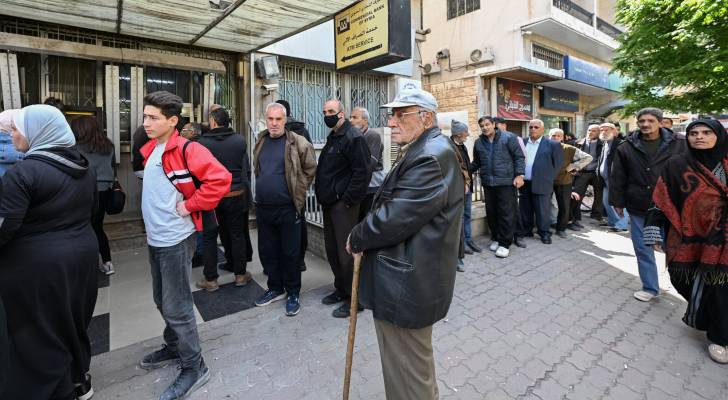People wait their turn in a queue outside an ATM in Damascus. (April 16, 2025)
Syria should not wait for sanctions relief before reviving economy: UN official
A visiting UN official said on Saturday that Syria's authorities should begin the process of economic recovery, without waiting for Western sanctions imposed under Bashar al-Assad's rule to be lifted.
The new government has been pushing for Assad-era sanctions to be removed to revive the country's battered economy and support reconstruction after nearly 14 years of war.
Some countries including the United States have said they would wait to see how the new authorities exercise their power and ensure human rights before lifting sanctions, opting instead for targeted and temporary exemptions.
"Waiting for sanctions to be lifted leads nowhere," Abdallah Al Dardari, the regional chief for Arab states at the United Nations Development Programme (UNDP), told AFP in an interview in Damascus.
"Sanctions are a challenge that must be addressed. At the same time, we must begin the process of economic recovery," he said.
Dardari said this process should include "projects... directly affecting citizens", the provision of services by civil society, particularly in education, and "the rapid improvement of public services".
"People need to feel the improvement quickly... especially in such a difficult period," Dardari said.
"With a clear vision and well-defined priorities, once the sanctions are lifted, funding will flow into Syria."
A February UNDP report estimated that at current growth rates, Syria would need more than 50 years to return to the economic level it had before its devastating civil war, and called for massive investment to accelerate the process.
The UN study said nine out of 10 Syrians now live in poverty, one quarter are jobless and the country's GDP "has shrunk to less than half of its value" in 2011, when the civil war began.
Syria's Human Development Index score, which factors in life expectancy, education and standard of living, has fallen to its worst level since it was first included in 1990, meaning the war effectively erased decades of development.
The UNDP report estimated Syria's "lost GDP" during the 2011-2024 war to be around $800 billion.
"The Syrian economy was supposed to grow to an annual GDP of around $125 billion in 2025, compared to $62 billion in 2010. Today, however, it is below $30 billion," said Dardari.
He said that in the war "375,000 homes have been completely destroyed" and more than 1.5 million were damaged.
He estimated the cost of reconstruction at "several tens of billions of dollars".
With reduced funding for international aid since Donald Trump's return to the US presidency, "it is imperative to find new effective means of financing", Dardari said.




